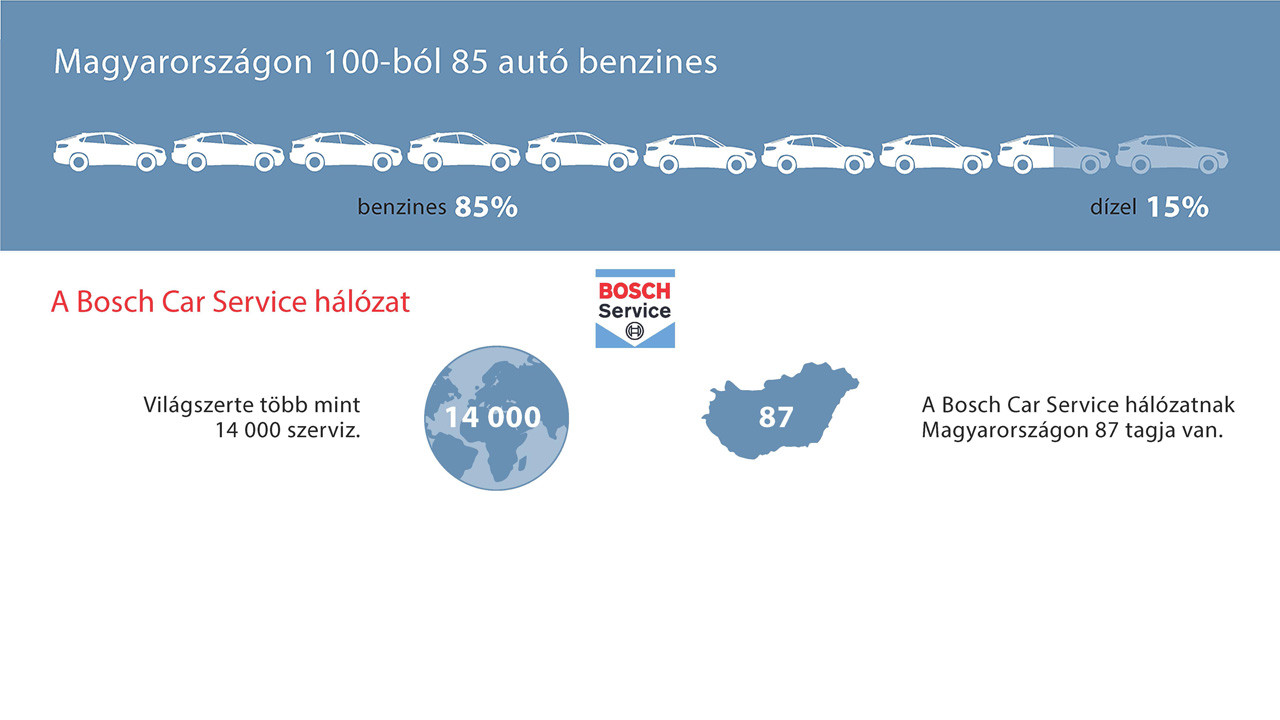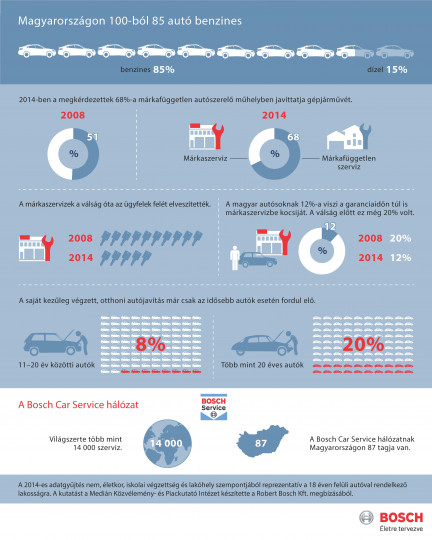This year, Robert Bosch Kft. – the leading international supplier of technologies and services – once again commissioned the Medián Opinion and Market Research Institute to survey cars, car use and car-repair habits in Hungary. Since data of this kind is largely unavailable elsewhere, the research fills a gap. What makes the survey even more valuable is that it has been carried out every two years since 2008, so that it has been keeping track of trends in cars and car-repair habits in Hungary since the start of the economic and financial crisis. The 2014 data was collected from 924 car-using households. The sample was representative by sex, age, level of education and geographical area of the over-18 car-owning population.
This year’s survey of Hungarian car owners’ driving and servicing habits has found that the vast majority of cars in the country still run on petrol. The latest figures show 85 per cent of Hungarian cars to be petrol-driven, 15 per cent diesel, with a statistically insignificant proportion having gas, hybrid or other kinds of propulsion. There has been no major change in the ratio of petrol to diesel cars since 2010 and 2012.
The survey is also revealing about the car-repair habits of the Hungarian population. Small, independent garages are the choice 68 per cent of respondents when they need their cars repaired. This is almost the same as the 2012 figure, showing that the market shift is now permanent. Between 2008 and 2012, the popularity of independent garages grew substantially at the expense of car manufacturer’s workshop (2008: 51 per cent, 2010: 61 per cent, 2012: 67 per cent). The figures show that owners tend to use the small garages after their car is more than 5 years old, although this tendency is less widespread in Budapest than elsewhere.
The use of car manufacturer’s workshop has slumped since 2008, i.e. the start of the crisis: they have on average lost nearly half of their customers. The latest figures show that 12 per cent of Hungarian motorists take their cars to the car manufacturer’s workshop after the guarantee expires. This is slightly less than the 2012 figure and sharply down from the pre-crisis state, when even beyond the guarantee period, one fifth of car owners took their cars to the car manufacturer’s workshop when they had problems with them.
Understandably, the use of car manufacturer’s workshop is most common for the repair and maintenance of the youngest cars: nearly a third – 29 per cent – of owners of cars no more than 5 years old take their cars to car manufacturer’s workshop even if they are not covered by the guarantee.
Neither has home repair by the owner completely come to an end: owners of older cars are more likely to try and fix them themselves, and if they need professional help, they usually go to small garages. The rate of attempted home repairs is 8 per cent for 11–20 year-old cars and 20 per cent for older cars. The figure for new cars is negligible.
The Bosch Car Service network
The Bosch Car Service is a brand-independent network of over 14,000 partner garages, tracing its beginnings to 1921, when the founder of the company, Robert Bosch, opened a workshop in Hamburg for servicing auto-electrical products. Over time, the range extended to cover diesel fuelling systems and – in the 1980s – to diagnostics for petrol-injection and anti-lock-braking systems. The Bosch Car Service concept of all-round servicing and repairs was launched in the late 1990s, by which time Bosch had become the largest independent automotive component manufacturer in the world. The Bosch Car Service network has 87 members in Hungary.
Mónika Hack
+36 70 510 5516
Bosch has been present in Hungary since 1899. After its re-establishment as a regional trading company in 1991, Bosch has grown into one of Hungary’s largest foreign industrial employers. In financial 2013, its 10 Hungarian subsidiaries then had a total turnover of HUF 719 billion and sales of the Bosch Group on the Hungarian market – not counting trade among its own companies – was HUF 161 billion The Bosch Group in Hungary employed more than 8 900 people at the beginning of 2014. In addition to its manufacturing, commercial and development business, Bosch has a network of sales and service operations that covers the entire country.
The Bosch Group is a leading global supplier of technology and services. In 2013, its roughly 281,000 associates generated sales of 46.1 billion euros. (NB: Due to a change in accounting policies, the 2013 figures can only be compared to a limited extent with the 2012 figures). Its operations are divided into four business sectors: Automotive Technology, Industrial Technology, Consumer Goods, and Energy and Building Technology. The Bosch Group comprises Robert Bosch GmbH and its more than 360 subsidiaries and regional companies in some 50 countries. If its sales and service partners are included, then Bosch is represented in roughly 150 countries. This worldwide development, manufacturing, and sales network is the foundation for further growth. In 2013, the Bosch Group invested some 4.5 billion euros in research and development and applied for some 5,000 patents. This is an average of 20 patents per day. The Bosch Group’s products and services are designed to fascinate, and to improve the quality of life by providing solutions which are both innovative and beneficial. In this way, the company offers technology worldwide that is “Invented for life.”
Additional information can be accessed at www.bosch.hu



